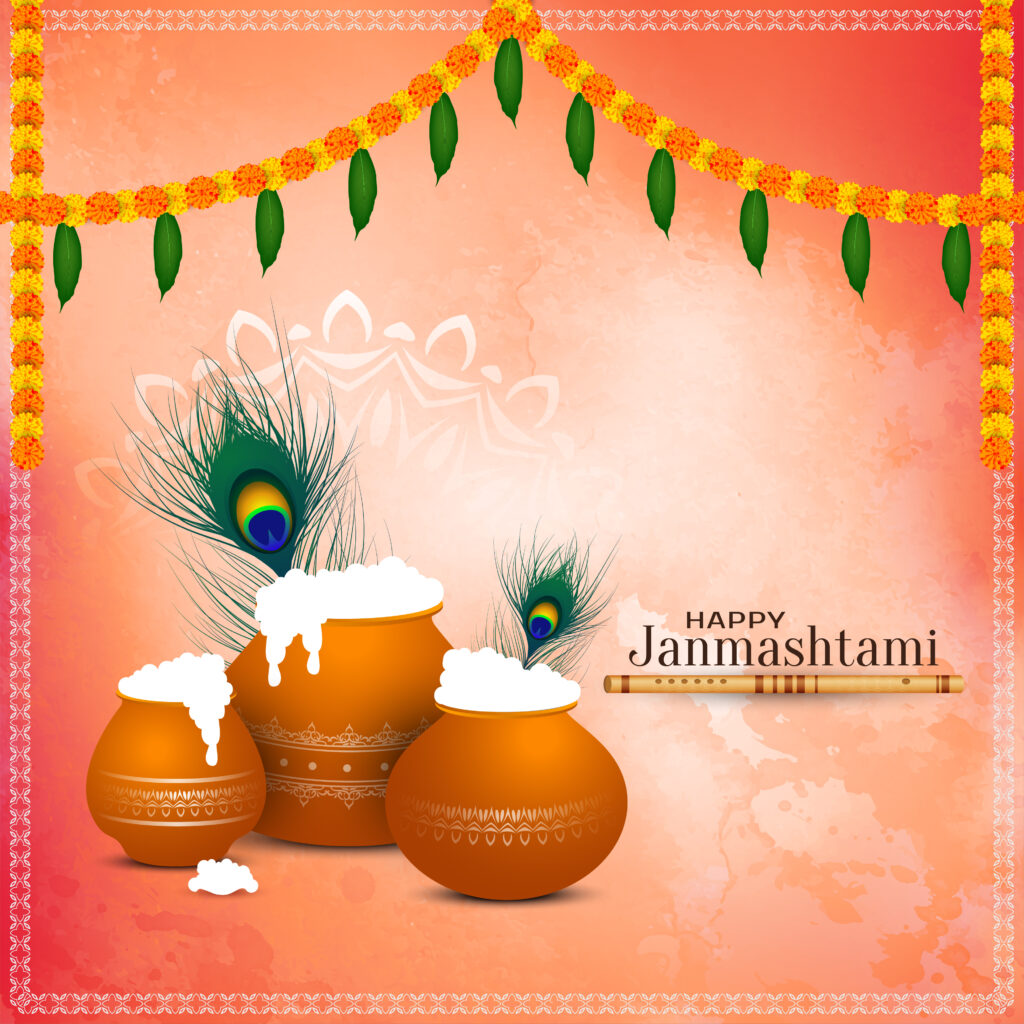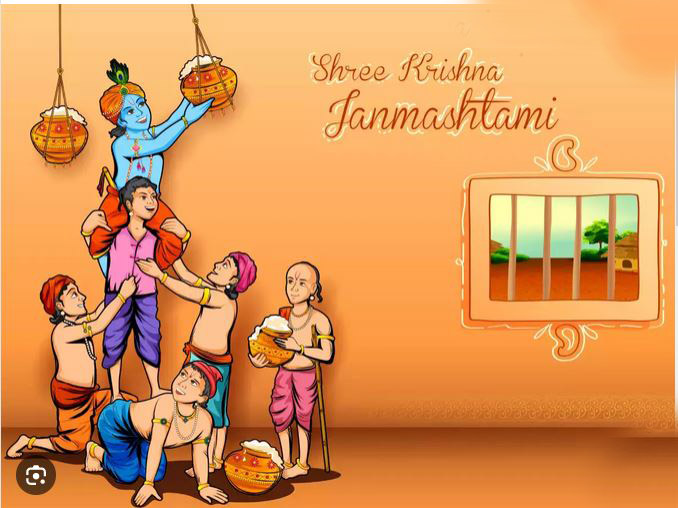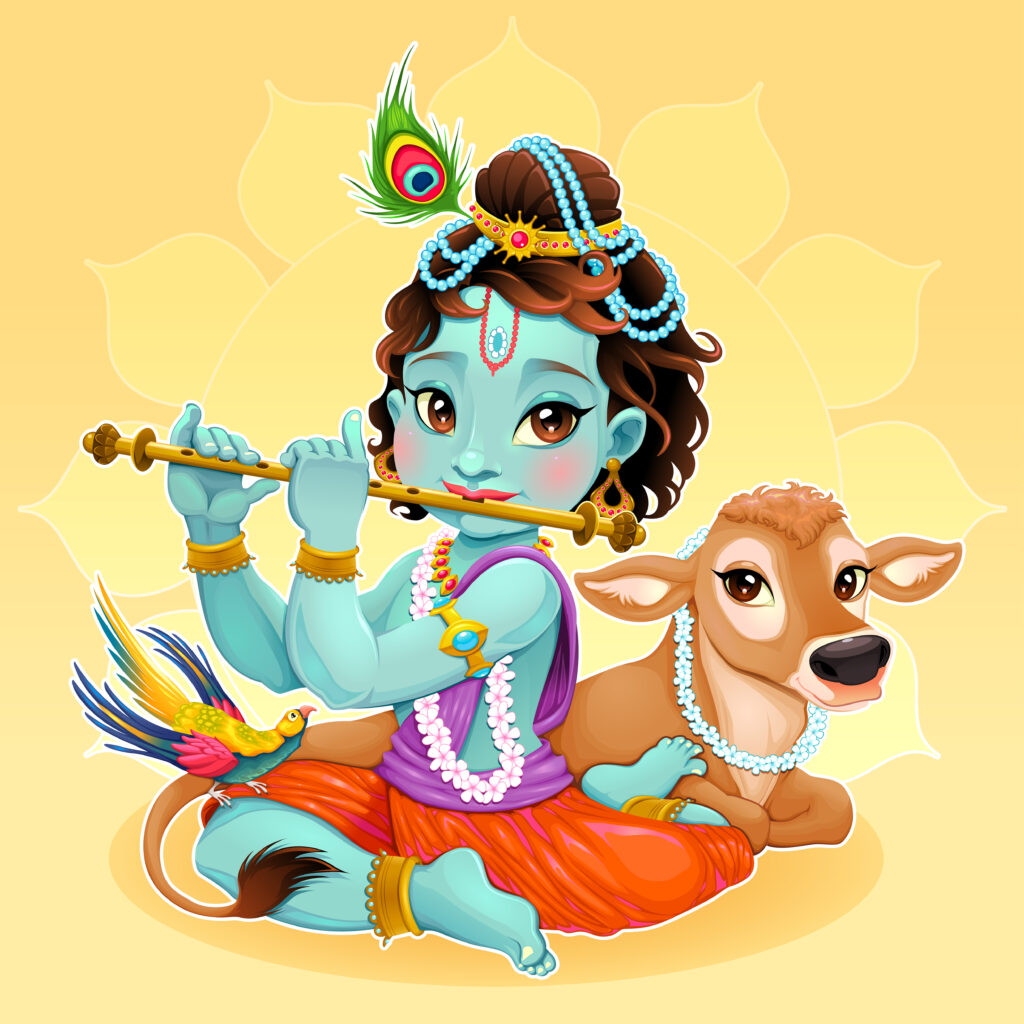Janmashtami, also known as Krishna Janmashtami, is a vibrant Hindu festival celebrated across India to commemorate the birth of Lord Krishna, an incarnation of Lord Vishnu. In the state of Odisha, this auspicious occasion is observed with great enthusiasm and reverence, highlighting the rich cultural heritage and devotion of the people.

Janmashtami falls on the eighth day (Ashtami) of the Krishna Paksha (dark fortnight) in the Hindu month of Bhadrapada (August-September). The festival holds immense significance for devotees who consider Lord Krishna as their beloved deity and guide. It is a time to reflect on his teachings, revel in his divine bliss, and seek his blessings for spiritual growth.
The celebrations begin days before Janmashtami, with devotees engaging in various preparations. Temples and homes are adorned with colorful decorations, flowers, and lights to create a festive atmosphere. Intricate Rangoli patterns are drawn at the entrances, symbolizing welcome and prosperity.
One of the highlights of Janmashtami in Odisha is the “Jhulan Utsav” or swinging ceremony. Devotees create beautifully decorated swings called “jhulas” and place idols or images of baby Krishna on them. They swing the jhula back and forth, singing devotional songs and offering prayers to Lord Krishna. This act represents the playful and joyous nature of Krishna’s childhood.
Another significant ritual during Janmashtami is the “Maha Abhishek” or grand bathing ceremony of the idols of Lord Krishna. Devotees bathe the idols with milk, curd, honey, and other auspicious liquids while chanting sacred mantras. This symbolic bath signifies purification and the washing away of impurities to reveal the divine essence within.
As midnight approaches, which is believed to be the time of Lord Krishna’s birth, devotees gather in temples and homes for the “Janma Utsav” or birth celebration. The atmosphere is filled with anticipation and excitement. Devotees sing devotional songs, recite hymns, and narrate stories about Krishna’s divine leelas (miracles) and teachings.
More: Wanted to download Odishashop.com visit here

At the stroke of midnight, special prayers are offered, and the birth of Lord Krishna is commemorated with great fervor. Devotees break their fast by partaking in a variety of delicious vegetarian dishes prepared as offerings to the deity. Sweets like “Poha Khai” (flattened rice), “Chhena Poda” (cheese cake), and “Kheer” (rice pudding) are especially popular during this festive occasion.
Janmashtami in Odisha also features vibrant processions known as “Nagar Parikrama.” Devotees dress up as characters from Krishna’s life, including Radha, gopis (cowherd girls), and cowherds. They parade through the streets, singing bhajans (devotional songs) and enacting episodes from Krishna’s life, spreading joy and devotion among onlookers.
The festival of Janmashtami holds deeper spiritual significance beyond the festivities and revelry. It serves as a reminder of Lord Krishna’s teachings about righteousness (dharma), love, compassion, and the pursuit of spiritual enlightenment. His divine leelas and the Bhagavad Gita continue to inspire millions around the world, guiding them on the path of self-realization and devotion.
Janmashtami in Odisha is a celebration that brings people together in devotion and adoration for Lord Krishna. It showcases the rich cultural heritage, deep-rooted faith, and unwavering devotion of the Odia community. The festival creates an atmosphere of love, unity, and spiritual upliftment, reminding individuals of the eternal presence of the divine in their lives.
You can read our another post on Rama Nabami in Odisha

As Janmashtami concludes, devotees carry the blessings of Lord Krishna in their hearts. The festival leaves a lasting impact, encouraging them to embody Krishna’s teachings of love, righteousness, and devotion in their daily lives. It instills a sense of joy, harmony, and spiritual awakening, nurturing a deeper connection with the divine and fostering a more compassionate and enlightened society.
Janmashtami in Odisha is a celebration that rejoices in the divine birth of Lord Krishna while honoring his profound teachings. It encapsulates the essence of devotion, cultural heritage, and spiritual wisdom, inspiring individuals to embrace Krishna’s message of love and righteousness in all aspects of life.
Write A FAQ For Janmashtami in Odisha Celebrating
What is Janmashtami in Odisha Celebrating Festival?
Janmashtami, also known as Krishna Janmashtami or Gokulashtami, is a Hindu festival celebrated to mark the birth of Lord Krishna. In Odisha, this festival is celebrated with great enthusiasm and is one of the major festivals in the state.
When is Janmashtami celebrated in Odisha?
Janmashtami is celebrated on the eighth day (Ashtami) of the Krishna Paksha (dark fortnight) in the month of Bhadrapada (August or September) according to the Hindu calendar. The exact date of the festival varies each year.
How is Janmashtami celebrated in Odisha?
Janmashtami in Odisha is celebrated with various customs and traditions. The highlight of the festival is the enactment of the ‘Rasa Lila’, which is a dance drama depicting the childhood leelas (divine activities) of Lord Krishna. Devotees observe fasting throughout the day and break it at midnight after the birth of Lord Krishna. Temples are beautifully decorated, and bhajans (devotional songs) and kirtans (prayers) are sung.
Are there any specific rituals associated with Janmashtami in Odisha?
Yes, there are certain rituals associated with Janmashtami in Odisha. One such ritual is the ‘Pahada,’ where a cradle is decorated with flowers and Lord Krishna’s idol is placed in it. Devotees take turns to swing the cradle, symbolizing the love and care given to the newborn Krishna. Another important ritual is the ‘Matka Phod,’ where young boys and men form human pyramids to break a suspended pot filled with buttermilk, imitating the makhan chor (butter thief) aspect of Lord Krishna.
Are there any unique features of Janmashtami celebration in Odisha?
Yes, Odisha stands out for its unique celebration of Janmashtami. The festival is primarily associated with the Jagannath cult in the state, and the Jagannath temples witness grand celebrations during this time. Apart from the Rasa Lila, the idols of Krishna and his consort Radha are beautifully decorated and worshipped. The famous temple of ISKCON (International Society for Krishna Consciousness) in Bhubaneswar also organizes special events and cultural programs to commemorate Janmashtami.
